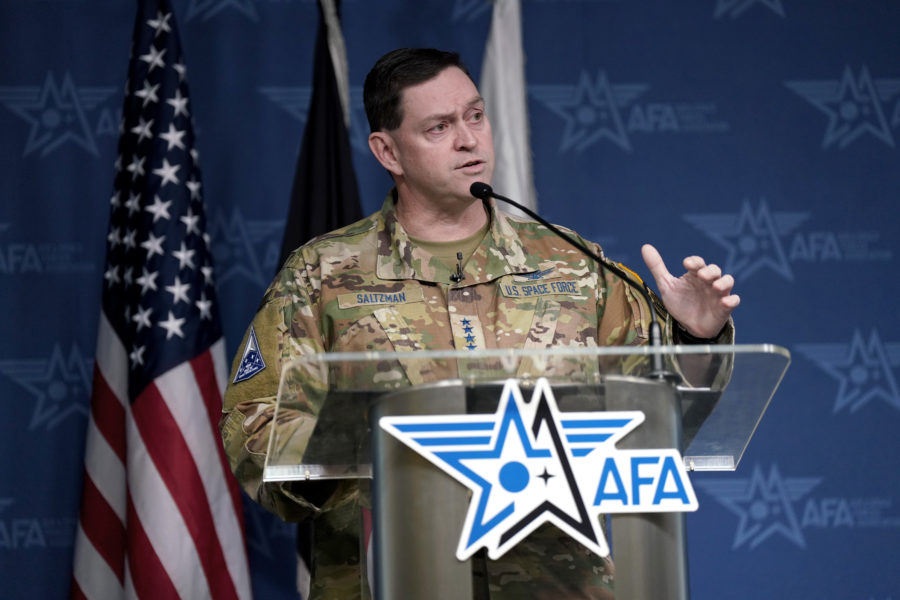The Space Force and the Pentagon have put considerable effort into making proliferating satellite constellations to make them more resilient against attack, but the ground stations and networks that communicate with those satellites pose a “backdoor” risk through which adversaries could potentially attack space capability, said Chief of Space Operations Gen. B. Chance Saltzman.
Speaking with reporters Jan. 31 at the Pentagon, Saltzman said vulnerabilities in ground systems highlight the extent to which space and cyber warfare are interconnected—a key lesson he’s drawn from the Russian-Ukraine war.
“Satellites in space are not useful if the linkages to them and the ground network that moves the information around and communicates with the satellites is not assured, is not capable, is not accessible,” Saltzman said. “We’ve witnessed some cyber activity that has hurt satellite operations. … When we think about satellite operations, if we’re not thinking about cyber protection of our ground networks, then we may have a backdoor, if you will, to negate satellite operations without counter-satellite operations.”
China and Russia’s counter-satellite capabilities have received scrutiny in recent years, from Russia’s direct-ascent anti-satellite missile test to China’s satellites with robotic arms that can “grapple” with other satellites. U.S. officials have begun warning those two countries could turn space into the next battlefield.
But the importance of ground networks hasn’t been lost on military space leaders. In May 2022, the Space Development Agency awarded a $324 million contract to General Dynamics Mission Systems to establish the ground operations and integration segment of Tranche 1 of what was then called the National Defense Space Architecture, but is now dubbed the Proliferated Warfighter Space Architecture.
At the time, an SDA official said the award as “really is the most critical element of Tranche 1,” noting that “without a ground segment, our space vehicles orbiting around the Earth can’t really do what we need them to do. They can do things autonomously, but really in order to make things work as a complete network, as a complete enterprise, you really do need the ground segments to manage the enterprise and the mesh and the control of the space layer.”
Around the same time, Lt. Gen. Stephen Whiting, head of Space Operations Command, warned that “cyberspace is the soft underbelly of our global space networks.”
In May 2022, Saltzman told reporters that those worrying solely about the Russians shooting down satellites are “missing the bigger picture,” and that the Space Force would need to establish its own component within U.S. Cyber Command, as it has recently with other combatant commands.
Saltzman cited several other lessons he is drawing from Russia’s invasion of Ukraine: the criticality of space to functions like command and control, and the importance of commercial space assets for things like connectivity or satellite imaging.
And he tied one more lesson back to the three lines of effort he recently released to Guardians and his overall focus on “combat credible forces.”
“High-quality equipment alone doesn’t make you successful,” Saltzman noted. “If you don’t have the training, the logistics, sustainability, the operational concepts to operate multi-domain axes—I think the Russians on paper had very good equipment, but they didn’t necessarily have the sustainment behind it, they certainly didn’t have logistics. And so this is … a comprehensive look at what it means to put a force on the field is going to be effective.”
Saltzman has emphasized the importance of the Space Force maturing its own training and operational concepts and said his other lines of effort are focused on “Amplifying the Guardian Spirit” and “Partnering to Win.” But he said Jan. 31 that he would not dictate how Guardians should go about pursuing those LOEs.
“We’re trying to … strike a different tone with those Guardians that are out there, the commanders that are out there in the field, that have to actually execute the operations. … I’m not going to be prescriptive,” Saltzman said. “I’m saying this is generally what I think is important. You tell me what activities you’re currently doing that supports these efforts, and let’s make sure we’re on the right track and they’re properly resourced and your timelines are consistent with how fast we need them.”
Saltzman said he wants Guardians to speak up share their thinking about “opportunities you’re not taking advantage of, or things that you need to be doing differently or that you don’t want to do so that you can realign your activities.”
The idea of his C-notes and other means of reaching out to share his thinking with the field is not to dictate how things should be accomplished, but rather set the mark of what needs to be accomplished. “I really want this to be a feedback from the field rather than a top-down prescriptive plan,” he said.
